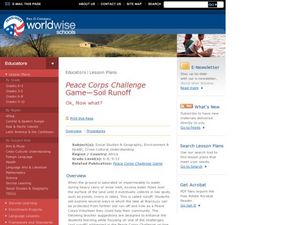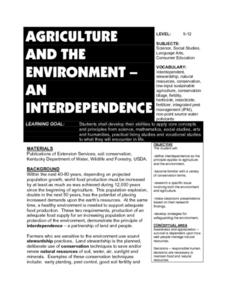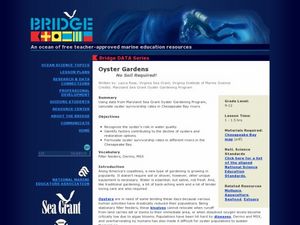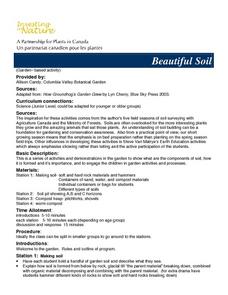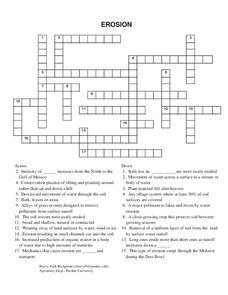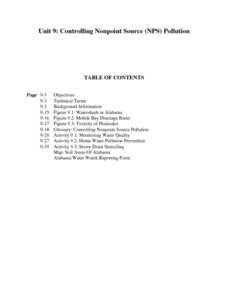Curated OER
Peace Corps Challenge Game: Soil Runoff
Students examine the causes and effects of soil runoff. In this environment lesson, students look at ways in which soil runoff is controlled. Students then play a game and discuss how the Peace Corps deals with soil runoff in African...
Alabama Learning Exchange
WATER You Doing to Help?
Auntie Litter is here to educate young scholars about water pollution and environmental stewardship! Although the 15-minute video clip is cheesy, it's an engaging look at the water cycle and conservation. Learners start by illustrating...
Kenan Fellows
Sustainability: Learning for a Lifetime – Soil
Do great gardeners really have green thumbs—or just really great soil? Environmental scholars discover what makes Earth's soil and soil quality so important through research and experimentation. Learners also develop an understanding of...
Curated OER
Water Pollution
Fifth graders study the impact of human activity on water quality and on the ecosystems of Earth. After a discussion on the various ways that water can be polluted, groups of youngsters get together to figure out the best way to clean a...
Curated OER
"Lettuce" Learn About the Water Cycle
Young scientists investigate the water cycle through a lettuce seed experiment. For this experiment, learners plant lettuce seeds inside of a ziplock bag in order to create a small greenhouse. They observe condensation and precipitation,...
Curated OER
WATER HERE AND THERE
Introduce the topic of water conservation with a little drama. Dressed as snowflakes, hail stones, or rain drops class members dramatize the events in a narration of the water cycle. The series of lessons that follow focus on...
Curated OER
Water Pollution
Here is a fine activity for fifth graders that will give them an idea of the variety of impacts that human-introduced pollutants have on the environment. After an initial class discussion and teacher-led demonstration, pupils brainstorm...
NASA
The Case of the Wacky Water Cycle
Join the tree house detectives in learning about the processes of the water cycle, water conservation, water treatment, and water as a limited resource.
Safe Drinking Water Foundation
Types of Water Pollution
In groups, young environmentalists investigate water samples that are contaminated with different types of pollutants. Each group presents their findings to the class and fills out the "Types of Pollutants Chart." This lesson is meant...
Safe Drinking Water Foundation
Demonstration of Water Pollution
In this teacher-led demonstration, your young environmentalists will observe and record how different types of water pollutants look when they are combined. From here, individuals will develop a hypothesis on how the water can be...
Marine Institute
Water Pollution
Sixth graders investigate the various types of pollutants found in water and ways to help prevent water pollution. Through a hands-on experiment, students create samples of polluted water by mixing water with vegetable oil, dirt, and...
Curated OER
Water Works Wonders
Students examine where water is found in the world, how we use it, and the various forms it takes. They observe the refraction of light through a prism, record the day and night sky over a week's time, and create a topographic model of...
Curated OER
What happens to water before we use it?
Students examine how water is treated prior to becoming available for human consumption. In this water treatment lesson, students conduct an experiment in which they filter water. Students formulate a hypothesis, test, analyze data, and...
Curated OER
Losing Ground
Students examine how effects of farming practices in the early 20th Century contributed to severe soil erosion of a large portion of the North American grasslands.
Curated OER
Agriculture and the Environment
Students investigate the interdependence of agriculture and the environment. They research areas of interdependence and provide examples of situations where farmers are practicing conservation in the local area. Their findings are...
Curated OER
Oyster Gardens - No Soil Required!
Explore the practice of oyster gardening. Because oysters play a vital role in marine ecosystems and their populations have declined, biologists are transplanting oyster seed to repopulate reefs. After learning about this practice,...
Curated OER
Beautiful Soil
Students discover what are the components of soil. They examine how it is formed and it's importance. They engage in garden activities and processes. They hold a handful of garden soil and describe what they see. They take a...
Curated OER
Erosion
Young scientists identify erosion, explain the causes of erosion, and name some techniques that can slow the process of erosion. Learners are divided up into groups of four and perform a simulation of soil erosion in class. The...
Illinois Department of Natural Resources
Section Two: Why is Biodiversity Important?
Explore soil, genetic traits, natural resources, and pollution in a series of lessons that focus on biodiversity. Kids complete experiments to learn more about the importance of varied genes and organisms in an ecosystem.
Curated OER
Stream Ecology In Wisconsin and Puerto Rico
Students identify the different types of water and explain in what proportions they exist on Earth. They identify and correctly label the parts of the water cycle and how these parts interact with each other. Students identify the...
Curated OER
"Wet" Your Appetite: Conserving Water
Students investigate how water is utilized in producing food. In this agriculture activity, students examine how much water goes into the creation of their daily menu. Students create a new menu that can conserve water and cut their...
Curated OER
Erosion
In this erosion worksheet, students complete a crossword puzzle given 17 clues about the types of erosion, the causes of erosion and the results of erosion.
Curated OER
Amazing Grazing: Keeping Our Ecosystem Running
Students discover the value of sustainability within our ecosystem. In this ecological lesson, students discuss the importance of a food cycle in our society, and how humans can improve the conservation of a healthy ecosystem. Eventually...
Curated OER
Controlling Nonpoint Source Pollution
Students examine factors affecting water quality. They test water in a local body of water to determine its quality. They collect data and continue monitoring the water monthly. They assess water quality in the home and on the farm.


